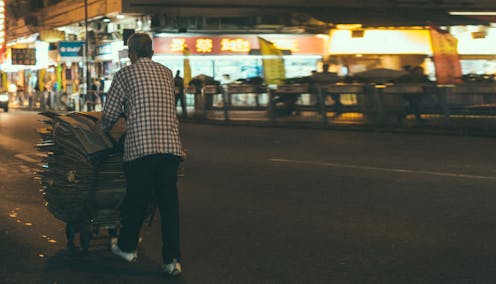China's capitalist reforms are said to have moved 800 million out of extreme poverty – new data suggests the opposite
- Written by Dylan Sullivan, Adjunct Fellow and PhD candidate in the Macquarie School of Social Sciences, Macquarie University

It has become an article of faith among many economists that China’s pro-market reforms of the 1980s and 1990s ushered in a sustained reduction in poverty.
This narrative relies on figures from the World Bank, showing that over the past 40 years the number of people in China living in “extreme poverty” (less than US$1.90 per day) fell by almost 800 million[1]. That’s a fair chunk of the world population, which is currently about eight billion.
The World Bank’s calculations suggest China’s rate of extreme poverty has plummeted from one of the highest in the world – 88% – in 1981, to virtually zero today, with the fastest gains in the 1980s and 1990s during the capitalist reforms of Chairman Deng Xiaoping.
It depends how you define purchasing power
The World Bank calculations use purchasing power parity[2], which is a standard way of comparing general purchasing power over time and between countries. But this approach does not tell us about people’s purchasing power over the specific goods and services that are necessary for survival. Because of this, scholars warn[3] that the World Bank’s method cannot give an accurate picture of real poverty trends.
In a new paper published in New Political Economy[4] we calculate extreme poverty rates for China using data published by the OECD, assessing people’s incomes against the prices of necessary subsistence goods; among them 2,100 calories per day, essential nutrients, three square meters of housing per person, clothing, heating and soap.
In contrast to the World Bank, we find that from 1981 to 1990 – at the end of the socialist period – China’s rate of extreme poverty was one of the lowest in the developing world. It averaged only 5.6%, compared to 51% in India, 36.5% in Indonesia and 29.5% in Brazil.
We find extreme poverty increased dramatically during the market reforms of the 1990s. It reached a peak of 68% as price deregulation pushed up the cost of basic food and housing, cutting the buying power of low-income people.
Extreme poverty then slid during the 2000s, but has yet to fall to the levels calculated by the World Bank.
Under communism, China subsidised necessities
The two approaches produce different answers because purchasing power parity adjusts incomes in accordance with the cost of all purchases including luxury goods rather than in accordance with the cost of basic items[5] needed for survival.
The difference matters a lot when comparing socialist and capitalist systems and assessing transitions between those systems. Socialist policies can keep the cost of meeting basic needs low in a way overall price measures don’t pick up.
This seems to have been the case in China. Until its market reforms, China’s government provided food and shelter at little or no cost. This meant US$1.90 was able to buy more basic necessities in China than in comparable capitalist countries.
As the government removed controls on the prices of basic goods and dismantled[6] its social security system throughout the 1990s, the price of necessities moved beyond the means of many.
Of course, these results may not hold if low-priced essentials were difficult to obtain in practice, something the OECD data[7] we used cannot tell us.
But other social indicators support our finding that extreme poverty was lower in China than in India, Indonesia and Brazil in the 1980s.
China performed better than these countries on several key social indicators, including life expectancy[8], infant and child mortality, mean years of schooling, and the share of the population with access to electricity[9].
It’s impossible to measure extreme poverty with absolute certainty. But our results are corroborated by other indicators and seem to suggest extreme poverty worsened during China’s reforms.
Economic growth by itself is not enough
It is important to clarify that our findings refer only to extreme poverty, defined as the inability to purchase essential food, shelter and a few basic necessities.
China’s impressive industrial development has, of course, led to substantial improvements in access to modern appliances, information technology and other goods. But when it comes to access to basic nutrients and housing, a large share of China’s population appears to have suffered during the move to a market economy.
Our findings have important implications. They suggest that although industrial development is an important goal, it can’t be relied upon to cut extreme poverty in and of itself, at least not in the context of capitalist reforms and social policy retrenchment.
Public ownership, price controls, and universal access to social services, of the kind advanced in China before the market reforms, can be at least as effective, especially at low levels of economic development.
Read more: China's population is now inexorably shrinking, bringing forward the day the planet's population turns down[10]
References
- ^ almost 800 million (www.worldbank.org)
- ^ purchasing power parity (ourworldindata.org)
- ^ scholars warn (papers.ssrn.com)
- ^ New Political Economy (www.tandfonline.com)
- ^ cost of basic items (www.aeaweb.org)
- ^ dismantled (www.scirp.org)
- ^ OECD data (www.oecd-ilibrary.org)
- ^ life expectancy (pubmed.ncbi.nlm.nih.gov)
- ^ access to electricity (www.tandfonline.com)
- ^ China's population is now inexorably shrinking, bringing forward the day the planet's population turns down (theconversation.com)

















